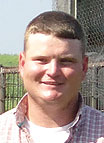
Mark and Dianna Pierce began their litter service to save money, but it has grown into a separate enterprise
Pierce Litter Services is a family-owned business owned by Mark and Dianna Pierce near La Russell, Mo.
Even with a decade of experience hauling chicken litter, cattle are their real passion and their cow/calf operation now spans 20 years.
Even though Mark was born and raised on a farm, he and Dianna ran the cow/calf operation while working town jobs. About 12 years ago, Mark decided to farm full-time and raising poultry was just the ticket. Building three, 600-foot houses was just the beginning of a path that has been very good to the Pierces, allowing them to live the dream of being independent agricultural producers.
Getting into the litter business grew out of necessity, growing into a large operation, branching into another business, over-the-road trucking.
“I realized I could save money by cleaning out my own houses and spreading the litter myself,” Mark said.
He purchased a skid steer and spreader truck to complete this task but soon his neighbors were calling to see if he could provide the same services commercially.
Mark hired one helper and then another, his nephew, who did all the spreading. But he still paid independent contractors to haul the litter. But in a leap of faith, decided to purchase over-the-road rigs to create a business that now serves both poultry producers on the front end and crop farmers on the receiving end.
Mark gives credit to an early chicken litter pioneer of the region, B & D Litter Services of Gravette, Ark., for sharing chicken litter knowledge to developing a blend from less desirable hen litter targeted for pasture use. However, after a fire destroyed their main building, the remaining owner, Denny Brown, closed the business.
“They were our competitors, but Denny was also willing to share his wisdom,” Mark recalled. “He was top dog in the area and the guy I wanted to most be like when it came to reputation and treating the farmer fairly.”
Poultry litter is comprised of manure from farm-raised birds, such as egg layer hens, broiler chickens or turkeys, combined with whatever bedding has been provided in the houses. One would think that manure is, well, manure but there is a difference in quality that impacts the price and end result for the crop farmer.
Litter is high in nitrogen, phosphate and potash, as well as small amounts of other essential elements, like boron, iron, magnesium, copper and zinc. It also carries over to multiple growing seasons and helps with water retention in the soil. But the key is where the manure came from.
“I like to tell people it is the original ‘Miracle Grow’,” Mark quiped.
Since broiler chickens are bred as meat birds, they are fed higher grade feed for weight, whereas, layer hens are on maintenance feed. Straight broiler litter is higher in nitrogen, phosphorus and potash; hen litter is typically mixed in a blend and marketed for pasture spreading.
Another factor is how many flocks have been in a house, the more the better. The routine number of flocks are seven until a clean-out, but sometimes the producer is required to clean sooner because of poor bird production or health.
He recommends that all farmers get their soil tested before ordering litter, since even different parts of a field may test differently. He also suggests asking for an analysis of the litter and for references from other customers.
Even though the market for litter has slowed some, they still do clean outs year-round, running four trucks and maintaining nine full-time employees and one part-time. In 2016, they moved 70,000 tons or 2,916 semi loads; their delivery range is roughly a 150-mile radius.






